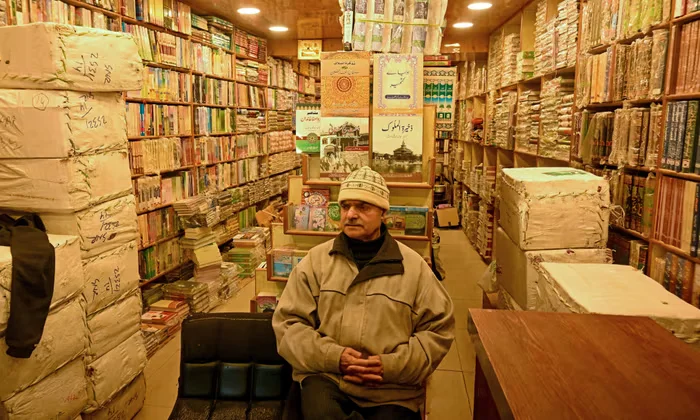February 21, 2025: Islamabad: – In a sweeping crackdown on dissent, Indian police in occupied Jammu and Kashmir have raided dozens of bookstores, confiscating more than 650 books—primarily works by the late Abul Ala Maududi, a 20th-century Islamic scholar and founder of Jamaat-e-Islami. The raids, which began last Friday in Srinagar before expanding to other towns, have sparked widespread anger among Kashmiri leaders and rights groups.
Indian police justified the Kashmir operation against bookstores by citing “credible intelligence regarding the clandestine sale and distribution of literature promoting the ideology of a banned organization.” While authorities did not initially disclose the name of the author, store owners confirmed that officers seized books written by Maududi. The confiscated titles were mostly published by Markazi Maktaba Islami Publishers, a New Delhi-based publishing house affiliated with Jamaat-e-Islami.
“These books were found to be in violation of legal regulations, and strict action is being taken against those found in possession of such material,” police said in a statement.
The raids are part of India’s broader crackdown on Jamaat-e-Islami, which was banned in 2019 under Prime Minister Narendra Modi’s government. New Delhi accused the organization of engaging in “activities against the security, integrity, and sovereignty” of the country. The ban was extended for another five years in February 2023.
Jamaat-e-Islami leaders, however, have strongly condemned the move, arguing that their literature is “legally published” in Delhi and does not promote violence. “The seizure of books is unjust, unconstitutional, and a violation of fundamental rights,” the organization said in a statement. “If the government has any security concerns, we are fully prepared to cooperate with any investigation. The current approach appears arbitrary and unfair, as it does not even fall within the scope of a legitimate investigation. Instead, it reflects an attempt to marginalize us.”
Also See: Pasban-e-Hurriyat Exposes Indian Atrocities in Jammu and Kashmir in January from 1990
Growing Concerns Over Repression in Kashmir
The crackdown on literature has intensified concerns about the suppression of civil liberties in the region, particularly since August 2019, when the Modi government revoked Kashmir’s partial autonomy and imposed direct rule from New Delhi. Many Kashmiris, along with international human rights organizations, have reported a drastic escalation in repression, including mass detentions, internet shutdowns, and restrictions on free speech.
“The seized books promote good moral values and responsible citizenship,” said Shamim Ahmed Thokar, a supporter of Jamaat-e-Islami.
Umar Farooq, Kashmir’s chief cleric and an advocate for the region’s right to self-determination, also condemned the police action. “Cracking down on Islamic literature and seizing them from bookstores is ridiculous,” he said, noting that such books remain widely accessible online. “Policing thought by seizing books is absurd—to say the least—in the time of access to all information on virtual highways.”
Pakistan’s Foreign Ministry also weighed in on the raids, denouncing them as “the latest step in a series of measures to crush dissent and intimidate the local people.” Ministry spokesperson Shafqat Ali Khan stated, “They must be given freedom to read the books of their choice.”
Decades of Conflict and Suppression
Kashmir has remained a flashpoint between India and Pakistan since the partition of 1947, with both countries laying claim to the region. The conflict has led to armed insurgencies, with tens of thousands of people killed over the past few decades.
When the armed rebellion intensified in 1989, Hizbul Mujahideen—the region’s largest militant group—declared itself the military wing of Jamaat-e-Islami. However, in its 2019 petition against the ban, Jamaat-e-Islami maintained that it had “never supported violence” and had “never been associated with Hizbul Mujahideen.”
The latest crackdown on Islamic literature is seen by many as part of India’s ongoing strategy to control Kashmiri voices and narratives. Critics argue that seizing books under the pretext of national security is an alarming step toward further stifling dissent and eroding fundamental freedoms in the already heavily militarized region.




![Ukrainian and Russian flags with soldier silhouettes representing ongoing conflict. [Image via Atlantic Council].](https://southasiatimes.org/wp-content/uploads/2026/02/2022-02-09T000000Z_1319661209_MT1NURPHO000HXCNME_RTRMADP_3_UKRAINE-CONFLICT-STOCK-PICTURES-scaled-e1661353077377.jpg)

